Raise your hand if someone’s told you to run for office in the past three weeks. Is every single one of your hands up? If not, I hope it’s because you’re not old enough yet (which I will forgive) — otherwise, raise ’em high, because I’m telling you now. You are smarter than our incoming President. I know since you’re taking the time to read this piece; I doubt he’s read a complete work of any kind in the past five years. So even if politics never appealed to you before, this may just be your moment to consider jumping in. We need intersectional critical thinkers to flood the political landscape and help win the war on facts. And with the most blatantly ableist President in modern history knocking on the door of 1600 Pennsylvania Avenue, disabled folks have got to lead that charge.
In honor of our Badass Disabled Women from earlier this year, here’s an all-new set of people who are making political noise (complete with enough links to fill up an afternoon, you’re welcome). And best of all, there are so many more of us out there than I can cover in one article — so this list will unfold in multiple volumes. That’s how hard we’re killing the game.
Let’s start with eight exemplary trailblazers who are preparing the way for you.
Tammy Duckworth
“I will go to work in the Senate looking to honor the sacrifice and quiet dignity of those Illinoisans facing challenges of their own. After all, this nation didn’t give up on me.”
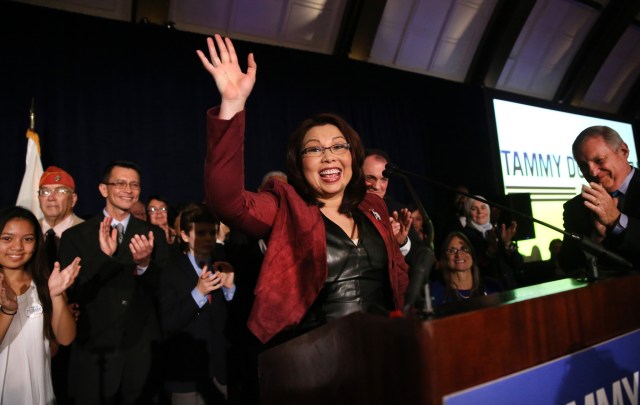
via Chicago Tribune
Okay I lied, I do want to check in with one of our Badass alumni first — and with good reason. Remember that Senate seat she was running for? Guess what? SHE WON, unseating incumbent Mark Kirk and becoming the first female Asian-American Senator Elect from Illinois. In her victory speech, she slammed Donald Trump’s “vile politics of fear and xenophobia that have sought to marginalize women, people of color, and immigrants” and reiterated her solidarity with queer people. She will bring to the Senate a strong record on LGBT issues, gun control, women’s rights, and veterans’ affairs, and is pledging to make her state a leader in renewable energy and affordable education. Seems like she’s got a lot of room to grow, too, given the recent success of another Illinois senator. Duckworth 2020!
(By the way, she lost her first congressional race back in 2006 and look at her now, so don’t tell me you’re too scared to try.)
Catalina Devandas Aguilar
“Unless women with disabilities are present fighting for inclusion as beneficiaries and main actors for change, the change will not happen. There need to be role models for women with disabilities and also real participation. Participation brings change little by little.”
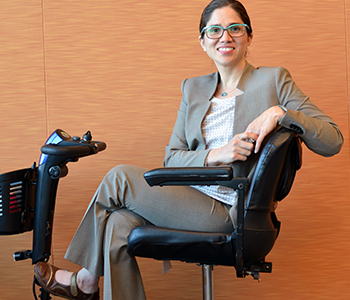
via UN Multimedia
Catalina Devandas Aguilar is the first ever United Nations Special Rapporteur on the Rights of Persons with Disabilities. She’s got quite a mandate in that role, including dialoguing with world leaders on disability rights, tracking violations of those rights, making concrete recommendations on how to improve disabled people’s social standing and legal protection, going on state visits and, specifically, “integrating a gender perspective throughout the work of the mandate.” She focuses on the concerns of women and indigenous people and is contractually obligated to involve other disabled folks in her recommendations (which isn’t something a ton of politicians/people in power anywhere usually care about).
Every year, Devandas Aguilar presents her findings to the UN Human Rights Council and General Assembly; you can find her 2016 reports (including easy-to-read versions that break it all down) here. And if you’d like a master class in intersectional feminism, read through her interview with CBM International where she takes us all to school on what ableism really looks like.
Şafak Pavey
“Many female politicians get intimidated by the aggressive behavior of men. I don’t.”
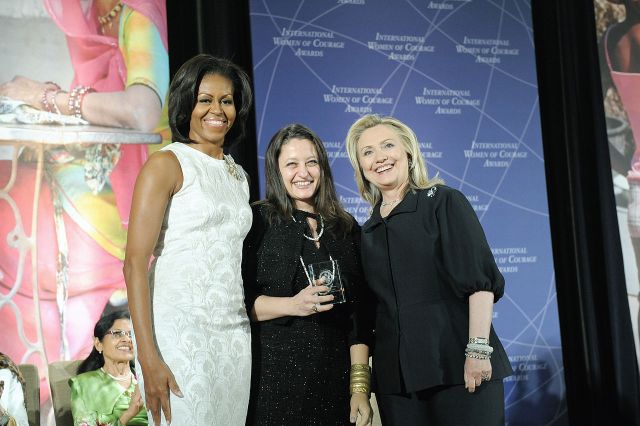
Living our collective dreams (via Wikipedia)
Şafak Pavey does not mess around. She is the first disabled woman ever elected to the Turkish National Assembly and has been fighting for women and girls, getting her haters fired, and striking fear into the hearts of men since 2011. She sits on (deep breath) the United Nations Committee on the Rights of Persons with Disabilities; the Turkey-EU-Accession Committee; the Euro-Med Parliamentary Assembly for the Mediterranean Union; the Euro-Med Sub-Committee on Energy, Water and Environment; and the EU-Turkey Joint Parliamentary Committee, and is Vice-Chair and Member of Turkish Parliamentary Friendship Groups with South Korea and Norway.
Her parliamentary inquiry into gender-segregated university dorms earned her the tag of “immoral woman” (sound familiar?) and she helped overturn the ban on female members of Parliament wearing pants instead of skirts. She’s written three books. She gave this incredible speech to the Association of Bone and Joint Surgeons when they met in Istanbul. And in 2012, then-Secretary of State and current My President Hillary Clinton presented her with the State Department’s International Women of Courage Award, adding an enviable photo op and lifetime bragging rights to her ever-growing list of accolades.
Claudia Gordon
“By my junior year in high school, I made it known to all that I would go to law school and become an attorney. Many shrugged off my grand intention as wishful thinking… those voices of doubt neither dictated my worth nor my capacity.”
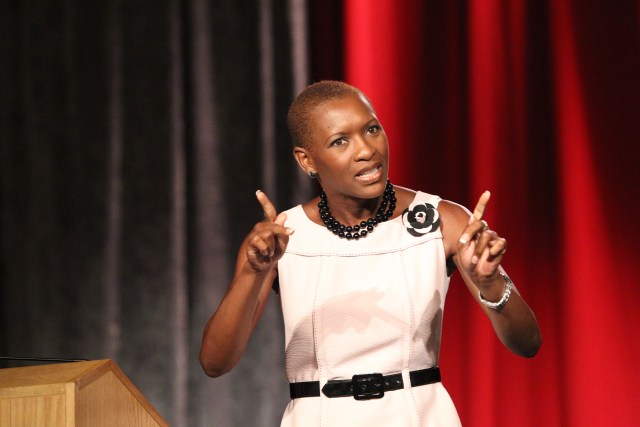
via whitehouse.gov
Being the first deaf black female attorney in the United States is probably enough for some people, but not Claudia Gordon. She’s currently Chief of Staff in the Department of Labor’s Office of Federal Contract Compliance Programs — which is to say she makes sure that federal government contractors don’t discriminate against disabled folks or anyone else. She previously worked in the White House Office of Public Engagement as a disability community liaison (a job currently held by someone you’re about to meet) and as a policy advisor at the Department of Homeland Security.
Last year Gordon spoke at the ADA25 Georgia Legacy Parade in Atlanta to mark the 25th anniversary of the Americans with Disabilities Act. As someone who was in the audience that day, I can confirm that she knows how to command a stage and bring it on the finer points of disability policy even when the organizers forget to give her a podium (oops). She was also part of President Obama’s delegation to the 2016 Paralympics.
Maria Town
“My role is to make sure that the disability community is connected to the things that are important to the President and that the President is connected to the things that are important to the disability community.”
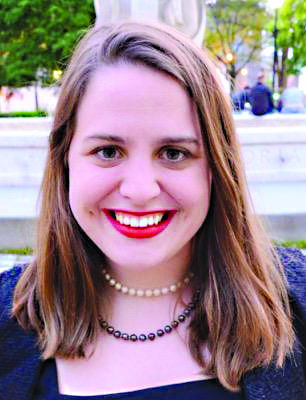
via Hammond Daily Star
Maria Town does all of the above as a Senior Associate Director in the Office of Public Engagement. She came to the White House from the Department of Labor’s Office of Disability Employment Policy, where she worked to improve employment opportunities for young disabled people. Now she’s responsible for engaging the disability community on behalf of the federal government and coordinating that effort across different agencies. Basically she’s our voice in the room, and she knows her stuff cold — you can hear her discuss the intersections of disability and Obama administration policy here, and follow her on Twitter if you enjoy being more informed than everyone around you.
Town is also the mastermind behind the all-too-real CP Shoes blog and, in the words of one of our mutual friends, “a fucking badass.” Co-sign.
Leah Katz-Hernandez
“The White House is really a model for accessibility for people with disabilities – and especially for deaf people. I believe my story sends a good message about the abilities of people who are deaf and Latino to be successful anywhere.”
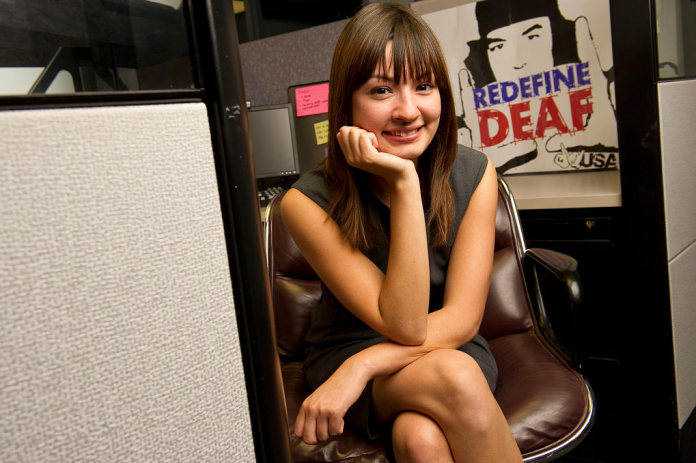
via ShareAmerica
I’m sorry to rub salt in our electoral wound by introducing you to all these incredible Obama appointees with 39 days left, but Leah Katz-Hernandez is worth it. She’s the first deaf person to serve as the official West Wing receptionist, known by the excellent government acronym of ROTUS. After interning at President Obama’s reelection headquarters in 2012, she accepted your dream job as Michelle Obama’s press assistant and research associate. She moved into her current position last year and now greets every single person who comes through the Oval Office. Additional responsibilities to be jealous of include managing the White House’s Roosevelt and Ward Rooms and the Presidential Box at the Kennedy Center. She was a Disabilities Constituency Coordinator on the Presidential Inaugural Committee for Obama’s second term and recently gave a tour of the West Wing in sign language, which you need to watch right now.
Maria Soledad Cisternas Reyes
“We have to remember equality before the law and full exercise of legal capacities for all persons with disabilities. There must be support and safeguards where necessary, so that [we] can defend [our] right to inherit [our] personal freedom.”
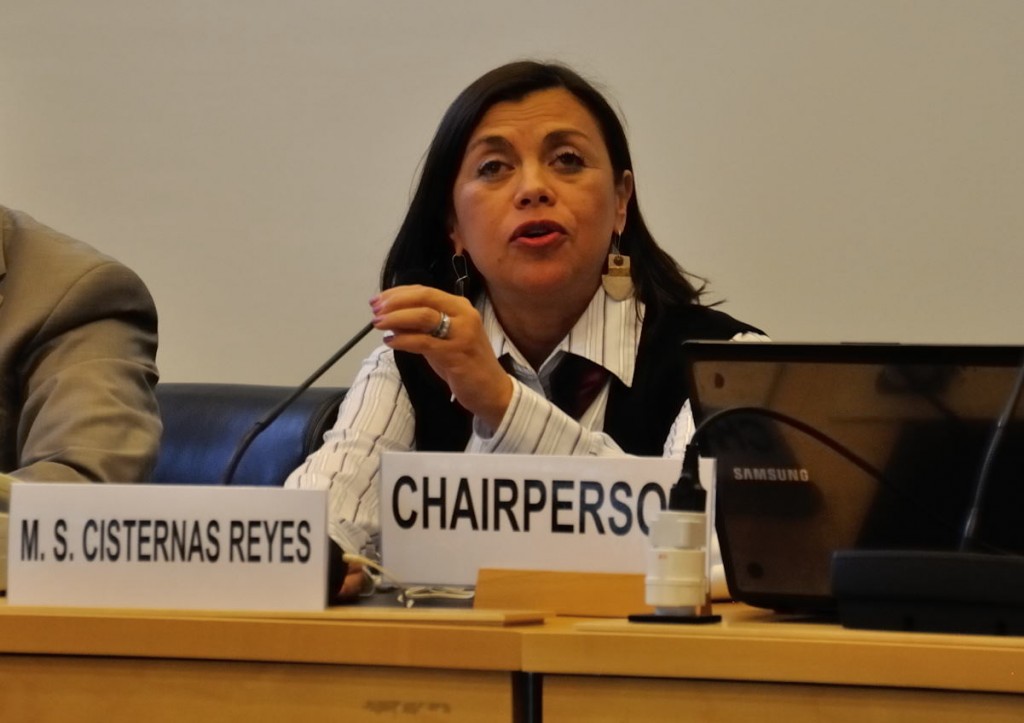
via ridh.org
The goddamn Chairperson, everyone. Maria Soledad Cinsternas Reyes is Chair of the UN Committee on the Rights of Persons with Disabilities — and the first woman to ever hold that seat. A lawyer by training, she also has the low-key day job of directing the Legal Program on Disability at Chile’s Diego Portales University. Besides the usual professorial responsibilities of teaching, lecturing, and researching, she helps produce television spots and educational materials around disabled people’s employment and voting rights. She was Chile’s spokesperson on the drafting committee for the Convention on the Rights of Persons with Disabilities that has since been ratified by 171 countries (fun fact: not including the U.S.!). Now she’s in charge of reviewing those countries’ adherence to the Convention, which she calls “the lighthouse which must guide us as we move into the new century.”
Her term as Chair expires on New Year’s Eve, so celebrate at least one shattered glass ceiling by watching her in action at the General Assembly.
Silvia Judith Quan-Chang
“I live my life fighting everyday as a woman, a feminist, and a woman with disabilities. Feminism has taught me a lot and, perhaps the most important aspect is that I am an independent person with my dignity, opinions, and the ability to follow my own criteria.”
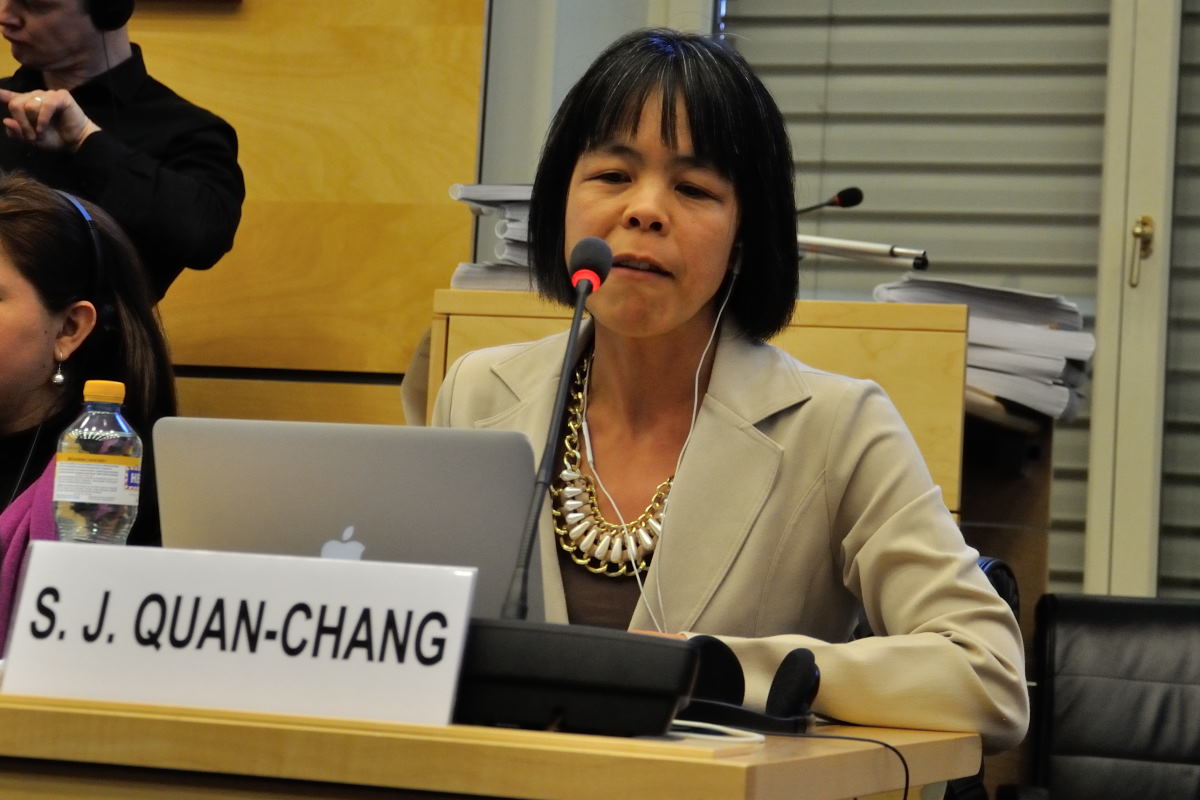
As a Vice Chairperson of that same UN Committee, Silvia Judith Quan-Chang proudly brings a feminist perspective to the table and has spoken about disabled women’s experiences at conferences around the world. She recently reviewed her home country of Guatemala’s adherence to the CRPD and is also a member of the Disability Rights Fund’s Global Advisory Panel and Steering Committee. (Takeaway of this article: if you’re getting into politics, prepare to sit on a lot of committees.) In her role as Director of the Disability Rights Advocacy Unit at the Guatemalan Ombudsman’s Office, she pushed for official declarations of human rights violations and got them — specifically naming the rights to health, accessible transportation, education, social security, freedom of association, and labor. She’s coordinated research projects on disability and sexuality and gender and disability through the Guatemalan National Council for the Disabled, so the rest of us really need to step up our government-funded advocacy game.
“As a woman with a disability, and I would like to underline this fact, I had to fight within the movement of persons with disabilities,” she told Disability Rights International. “We are only few — women with disabilities who have had the opportunities to learn, reflect, and evaluate our condition with respect to gender and disability.”
I ended the Badasses list with some Grade A self-deprecation: “Feeling inadequate yet? Great, me too.” But we don’t have time for that bullshit anymore, right? So let’s make a deal to stop half-joking about being woefully unqualified. We are all more than capable of getting out there and fixing things in this new year, just like these women do — whether that’s through volunteer hours, protests, online activism, one-to-one dialogue, or campaigns of our own. It’s past time to stop hiding and start doing. Let’s go. You got this.



Carrie your writing style is powerful and that last paragraph had me fist bump the air in excitement. Thank you !
If you do another of these, I have a couple of suggestions – Baronness Tanni Grey-Thompson and Baroness Jane Campbell, who both sit in the House of Lords. Tanni and I had a private message convo on Twitter and I fangirled massively over it. So much so that I am telling you now. Because she is awesome. These are appointed rather than elected roles(which is a whole separate issue) but it is fantastic having these awesome women to look up to and they have both done a lot of work for disability rights. I also hope Emily Brothers will one day be on this list – she was the Labour parties first out Transgender parliamentary candidate, and she is visually impaired. I met her at our party conference and she’s awesome. I am hoping to stand in local elections next year. A large part of my platform will be more dropped curbs. So you know, not world changing, but I personally would feel a lot safer in my home town if there were more!!
Yes it would be nice to see some content on this site from outside the Americas.
From Australia we have Kelly Vincent who represents Dignity for Disability in South Australia. She was also the youngest women elected to any Australian parliament, back in 2010.
Tanni, Jane, and Kelly are all slated for volume 2 of this list, which is coming in the new year. And I had not heard of Emily, so I will look her up! Thank you!
Yay! Excited for that list already
I’m so confused…are any of these women queer? Why are you invisibilizing queer disabled people by including mostly straight women?
“8 Disabled Women Who Are Changing the World Through Politics”
That’s the headline, these are disabled women picked for the way they are changing the world through politics.
In no way does that make queer disabled women invisible.
Noting disabled women who may likely identify as straight does not reduce disabled queers. The visibility of disabled women in powerful roles is a powerful message for all women. You have to remember the all-too-often invisible population of disabled women in positions of power in general. That matters.
It would be awesome — it will be awesome — when there is a substantial enough list of queer women in politics, maybe we can continue to add on to this group of women with more examples who are in fact both queer and disabled, but the fact that these women may identify as straight doesn’t disenfranchise queer disabled people, queer disabled women ARE disabled women. It’s a huge piece of this identity.
If you know of some disabled gay ladies in politics that need to be pointed out, mention them as others have and add to the conversation.
whoops: “when there is a substantial enough list of queer *and disabled* women in politics…….”
If you do another list or expand this one, then next time you may wish to include Wilma Newhoudt-Druchen, a deaf woman who is a member of the South African national parliament. She was a parliamentarian for many years, then was out of parliament for a while because her political party didn’t do as well in elections, but she is now back in parliament. She was the first South African national parliament to have a sign language interpreter with her on the parliament floor–she had to fight to bring one in because of regulations saying that only parliament members could be on the floor. She is also the first South African parliamentarian to use sign language when she speaks on the floor.
Since she is married to a man, I am guessing that she is straight, so I know she won’t help in terms of lgbtiqa+ disability representation, but is still crucial to disability representation, including for non-white disabled people, in South Africa!
I am not personally aware of disabled politicians who are also openly lgbtiqa+, but then I am not familiar with all people with disabilities working in politics or government either so I may just be unaware. I do agree it would be great to highlight them if they exist. But not all non-disabled lgbtiqa+ politicians openly identify as such either, so I would imagine that at least some of any existing lgbtiqa+ disabled politicians would still be closeted also.
YESSSSSS Carrie! Claudia Gordon, be still my heart.
Hi Carrie, I’m interested in contacting some of these women so they may advise me on my career. I’ll spare you my boring background but can say it’s feasible that with the right guidance I could be one of them some day. How can I get in touch with you personally? I know this is a long shot but if you can respond to my email add I’d love you for it :)
Hi! I am not in touch with any of them personally, so I can’t do much for you there. But many of them are on Twitter or have email addresses that are available through the agencies that they work for. That seems like it’d be your best bet.
It’s great that you want to follow their example–we need more people like you.